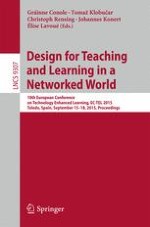2015 | OriginalPaper | Chapter
Comparing Two CbKST Approaches for Adapting Learning Paths in Serious Games
Authors : Javier Melero, Naïma El-Kechaï, Jean-Marc Labat
Published in: Design for Teaching and Learning in a Networked World
Publisher: Springer International Publishing
Activate our intelligent search to find suitable subject content or patents.
Select sections of text to find matching patents with Artificial Intelligence. powered by
Select sections of text to find additional relevant content using AI-assisted search. powered by
